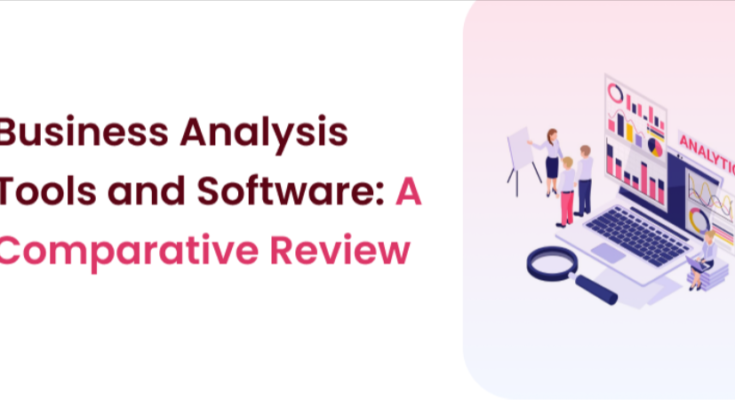In today’s fast-paced business landscape, staying competitive and making informed decisions is crucial. Business analysis tools and software have become indispensable for organizations of all sizes to gather, analyze, and interpret data. These tools empower businesses to uncover insights, improve processes, and drive growth.
Business Analyst Online Training offers flexibility and convenience, allowing professionals to learn business analysis tools and software at their own pace. It’s cost-effective, eliminates geographical constraints, and provides access to expert instructors and resources.
In this blog, we will provide a comparative review of some popular business analysis tools and software, shedding light on their features, benefits, and limitations.
⇒Join us on Telegram for more Sure and Accurate football-winning tips every day...click here
1. Microsoft Excel
Microsoft Excel is a highly popular business analysis tool thanks to its familiar and user-friendly interface, catering to users of all levels, from beginners to experts. It stands out as an excellent choice for small to medium-sized businesses, especially those working with constrained budgets. Its affordability and accessibility make it an essential tool for data storage, basic analysis, and spreadsheet customization, aiding businesses in their decision-making processes.
Key Features
- Data storage and organization.
- Basic data analysis and chart creation.
- Customizable spreadsheets for various business purposes.
- Simple formulas and pivot tables.
Benefits
- Affordable and widely available.
- User-friendly for basic data analysis.
- Extensive online resources and tutorials.
- Compatible with other Microsoft Office applications.
Limitations
- Limited capacity for large datasets.
- May be prone to errors.
- Limited advanced data analytics capabilities.
- Difficult to collaborate in real time.
2. Tableau
Tableau is an impressive data visualization tool that empowers users to convert raw data into interactive, easy-to-share dashboards. This makes it an excellent choice for businesses that place a strong emphasis on making informed decisions based on data. With Tableau, you can effortlessly turn complex data into visually engaging displays, helping your organization unlock valuable insights and enhance its data-driven decision-making processes.
Key Features
- Data connection and blending.
- Drag-and-drop interface for creating interactive visualizations.
- Real-time data updates.
- Collaboration and sharing features.
Benefits
- Exceptional data visualization capabilities.
- User-friendly interface for data exploration.
- Supports large datasets.
- Strong community and customer support.
Limitations
- The steeper learning curve for beginners.
- Pricing can be on the higher side.
- Limited data preparation and cleaning features.
- May require additional tools for advanced analytics.
3. Power BI
Power BI, a Microsoft product, is a powerful tool for data analysis and visualization, ideal for business intelligence. What sets it apart is its seamless integration with other Microsoft applications, making it a preferred choice for organizations within the Microsoft ecosystem. This synergy allows for efficient data-driven decision-making and enhanced productivity.
Key Features
- Data connectivity and transformation.
- Customizable dashboards and reports.
- Collaboration and sharing options.
- Natural language queries.
Benefits
- Integration with other Microsoft products.
- User-friendly interface.
- Wide range of pre-built visualizations.
- Strong security features.
Limitations
- Limited advanced analytics capabilities.
- Premium features come at a cost.
- Can be resource-intensive for very large datasets.
- Learning curve for complex data modeling.
4. Google Data Studio
Google Data Studio is a no-cost data visualization tool from Google. It empowers users to craft and distribute interactive reports and dashboards. This tool is particularly beneficial for businesses that utilize various Google applications, providing a seamless integration for efficient data analysis and sharing.
Key Features
- Data source connectivity.
- Drag-and-drop report creation.
- Collaboration and sharing options.
- Integration with other Google products.
Benefits
- Free to use.
- Seamless integration with Google services.
- Easy-to-use interface.
- Customizable templates and reports.
Limitations
- Limited data transformation features.
- Limited advanced analytics capabilities.
- May not be suitable for complex business scenarios.
- Real-time data connections may be slower.
5. QlikView
QlikView is a sophisticated data analysis and visualization tool known for its rapid data processing. It excels in quickly retrieving and analyzing data due to its unique in-memory processing capability. This makes it an excellent choice for businesses dealing with complex data analysis needs. Its ability to handle and process large datasets efficiently makes it a valuable asset for organizations seeking in-depth insights from their data, ultimately aiding in better decision-making.
Key Features
- In-memory data processing.
- Associative data model for exploration.
- Drag-and-drop dashboard creation.
- Collaboration and sharing features.
Benefits
- Excellent performance for data exploration.
- Powerful associative data model.
- Scalable for handling large datasets.
- Strong support for custom scripting.
Limitations
- Higher pricing.
- Steeper learning curve.
- Limited pre-built visualization options.
- May require skilled IT resources for setup.
6. SAS Business Intelligence
SAS Business Intelligence is a comprehensive suite designed for advanced analytics and business intelligence. It’s an excellent choice for large enterprises with intricate data requirements and a strong emphasis on making decisions based on data insights. This suite of tools empowers such organizations to analyze and interpret complex data, enabling them to make informed choices that drive their business forward.
Key Features
-
Data integration and transformation.
- Advanced analytics and machine learning.
- Reporting and dashboard creation.
- Strong security and compliance features.
Benefits
- Robust data integration and transformation capabilities.
- Advanced analytics and predictive modeling.
- Comprehensive reporting and dashboarding.
- Excellent support for regulatory compliance.
Limitations
- High cost of ownership.
- Requires specialized training and expertise.
- May be overkill for small businesses.
- Less user-friendly for casual users.
7.IBM Cognos Analytics
IBM Cognos Analytics is a comprehensive business intelligence platform designed for big organizations. It offers a wide array of tools for creating reports, dashboards, and exploring data. This platform is ideal for larger enterprises seeking an all-encompassing solution to meet their data analysis and reporting needs. With its advanced features and capabilities, IBM Cognos Analytics empowers businesses to make informed decisions and efficiently manage their data-driven operations.
Key Features
- Data integration and modeling.
- Report and dashboard creation.
- Collaboration and sharing features.
- AI-driven insights.
Benefits
- Scalable for handling large datasets.
- AI-powered analytics for automated insights.
- Strong support for governance and compliance.
- Integration with other IBM products.
Limitations
- High cost of ownership.
- Complex setup and maintenance.
- Learning curve for advanced features.
- May require specialized IT skills.
Conclusion
Selecting the right business analysis tool or software depends on your organization’s specific needs, budget, and expertise. Microsoft Excel, Tableau, Power BI, Google Data Studio, QlikView, SAS Business Intelligence, and IBM Cognos Analytics each offer unique features and capabilities.
For small to medium-sized businesses with limited budgets, Microsoft Excel or Google Data Studio can be a cost-effective choice. If your focus is on data visualization, Tableau and Power BI are excellent options. QlikView is ideal for complex data analysis, while SAS Business Intelligence and IBM Cognos Analytics are well-suited for large enterprises with advanced analytics and compliance requirements.
Ultimately, the choice of the right tool should align with your business goals and objectives, ensuring that you can make informed decisions and gain a competitive edge in the ever-evolving business landscape.




